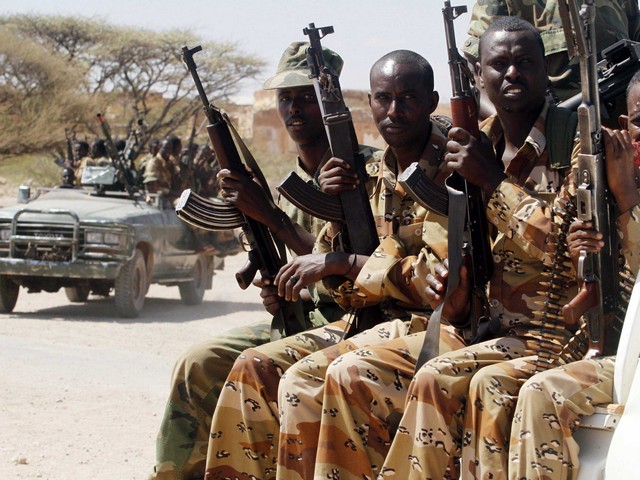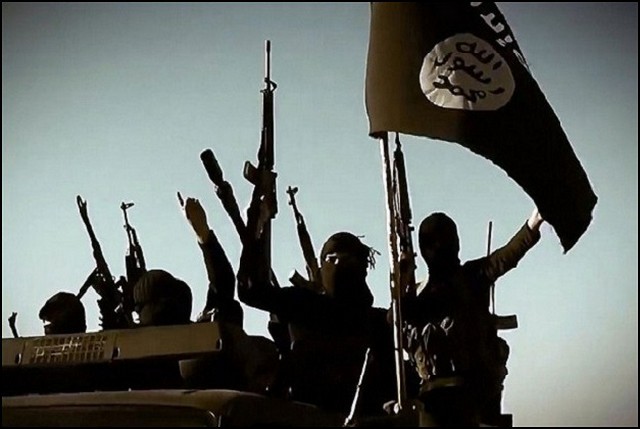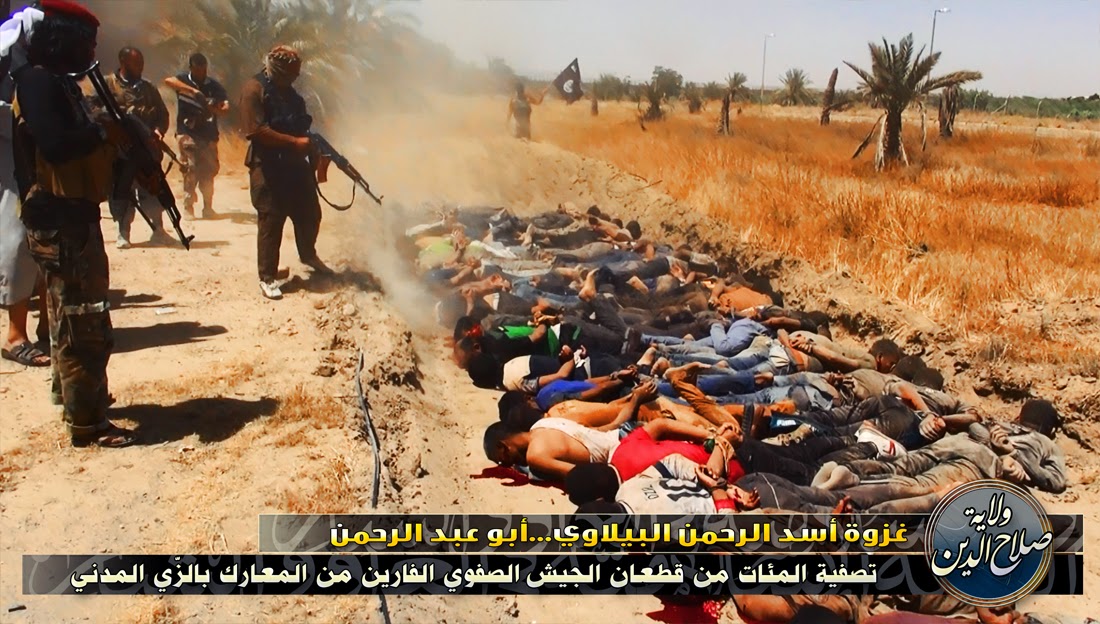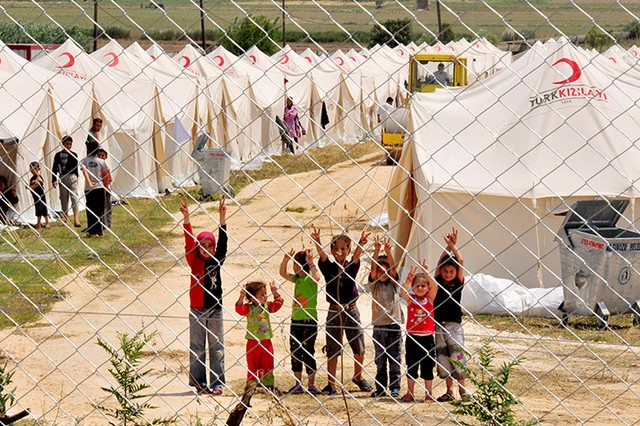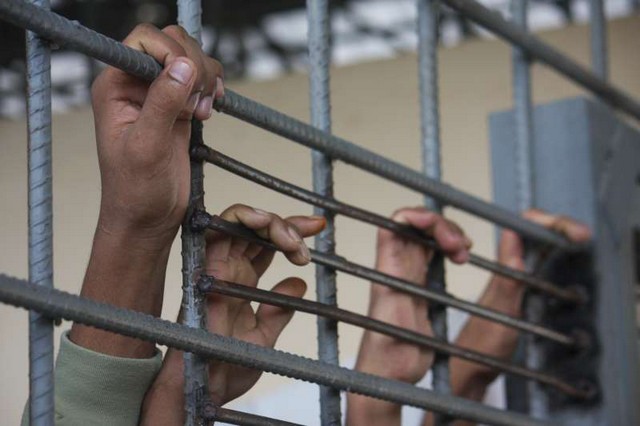By Gerald A. Perreira
The Organization of North Atlantic Tribes (NATO) brought together the enemies of the Libyan revolution under one umbrella to achieve their desired outcome. This concoction of insignificant non-entities and murderous gangs parading as ‘jihadists’ are now fighting each other over the spoils of war. They have been handed a resource rich nation state and are now one of the major supporters of the Islamist death squads throughout the region.
Truth be told, Barak Obama is a political dunce. Soon after Obama became the first Black president of the United States, Hugo Chavez presented him with a copy of Eduardo Galeano’s excellent work, Open Veins of Latin America. Obama should have read it.
Hugo Chavez presenting Obama with a copy of Eduardo Galeano’s book, Open Veins of
Latin America.
At that time, Hugo Chavez, Muammar Qaddafi and a number of other revolutionary and progressive leaders saw a glimmer of hope with Obama’s election. It was not that these leaders did not understand the nature of the American political system. Of course, they understood only too well that all talk of US democracy is a sham. They knew that the US political system offers a mere façade of democracy which allows for the rule of capital, and that both Republicans and Democrats are ideological-political expressions of the same ruling class. The ballot box cannot undo the power elite in American society.
They also knew that Obama was a political neophyte – a novice on the global stage – but a seemingly intelligent one – at least that’s how it appeared back then. It seemed that he might have the empathy and intelligence to listen and learn. Unfortunately he did not, and the rest is history. At that moment, soon after his election, when he appointed an array of advisors with connections to all manner of nefarious forces, including well known Zionists, the hope faded. Obama chose drones over his promise of diplomacy and dialogue, and chose to appease the forces of white supremacy, over his promise to bring about meaningful change.
It quickly became apparent that the Black face in the White House was the latest addition to white supremacy’s arsenal. Ill-informed and therefore easily misinformed, Obama has committed one foreign policy blunder after another with nightmarish consequences, especially for the Global South. When Obama made the fallacious comment that ‘Qaddafi had lost all credibility and that he must go’, it was obvious that he was being fed misinformation by deceptive forces bent on redesigning Africa and the Arab world. Under his presidential watch, even morons like McCain have thrived rather than being discredited, and have been used to galvanize support for the Obama’s incoherent and irrational foreign policy.
Recently I heard a sound bite that went like this, ‘Libya is in chaos as the armed militias that overthrew Qaddafi wage war on each other’. Notice how the pro-imperialist media conveniently remove the mass murderers in Britain, the US, France, the Netherlands, Saudi Arabia, Qatar and the United Arab Emirates (UAE) from the equation, even though it is crystal clear that without their intervention in Libya, the Jamahiriya could never have been overthrown, precisely because there was never a popular uprising against Qaddafi and the revolution. Even former Prime Minister of Italy, Silvio Berlusconi, in a statement he made during a meeting of his party, Forza Italia, was forced to admit that: ‘This has nothing to do with a popular uprising. The Libyan people love Qaddafi, as I was able to see when I went to Libya…Powerful people decided to give life to a new era by trying to oust Qaddafi.’
The fact is, there was a popular uprising in support of Qaddafi and the Jamahiriya and against the invaders. This has become even clearer in the aftermath of the invasion, as more than 2.5 million Libyans have been forced to flee their country, and this is only the number of those who have been documented at border crossings and by refugee organizations. The real figures are much higher. When you consider that the total population was 6 million prior to the invasion, you then realize how devastating the situation has become. Libya is in chaos and the suffering is tangible. Imagine in the recently held elections, only 630,000 people turned out to vote. That is not a low show – that is a no show.
The popular uprising in Libya was in support of the Jamahiriya: during the invasion of Libya, 1.7million people, 95% of the population of Tripoli and one third of the entire population of Libya, gathered in downtown Tripoli in perhaps the largest demonstration in world history to support Qaddafi and the revolution.
In contrast, the recent elections in Libya held on June 25th, 2014 saw polling booths all over Libya empty – only 630,000 people turned out to vote.
Qaddafi really did create a Jamahiriya – translated as a state of the masses. The Libyan people stayed away from the polls in droves – it was probably the most impressive election boycott in history.
As Qaddafi outlined in The Green Book, ‘Democracy means, literally, the authority and sovereignty of the people – the entire people. It is not a monolithic product as the West would like us to believe’
Authority of the People certainly does not exist in the US or Europe.
Michael Parenti, in his ground-breaking work, Democracy for the Few, pointed out the framers and shapers of the US constitution, people like Elbridge Gerry, Alexander Hamilton and even George Washington, were all contemptuous of democracy. Gerry is on record referring to democracy as ‘the worst of all political evils’. Alexander Hamilton advocated for a strong state to ‘check the imprudence of democracy’. And Washington, who once traded an African slave for a barrel of molasses, cautioned those who were drafting the constitution not to produce a document to please the people.
The entire US political system is a sham, not just today but from its inception, and every country has the right and should be prepared to defend their gains and national dignity against re-colonization in the guise of their fallacious notions of ‘multi-party democracy’, ‘human rights’ and ‘rule of law’.
It is important to note that the so-called rebels never won a single battle during the invasion of Libya; everything was handed to them on a platter by the imperialist ground and air forces. With the overthrow of the Jamahiriya and the murder of Muammar Qaddafi, this bizarre concoction of monarchists, thugs parading as Jihadists and other reactionary forces are now at each other’s throats. They most definitely have no clue as to how to put together a plan to re-build and govern Libya.
What has resulted from the overthrow of the Libyan Jamahiriya is so hideous that even the imperialists don’t have the stomach for it. Libya hardly gets a mention now – the odd sound bite here and there. And anyway, who cares? Now that Qaddafi and the Jamahiriya are gone and Africa is once again a playing field for all and sundry, the mission is accomplished.
Qaddafi’s extensive popularity and influence throughout Africa, along with the fact that Libya was prepared to throw its economic might behind the Pan-African project, acted as a bulwark to all who wanted to lay their hands on Africa’s resources. And that is just about everyone. Even the Saudi’s and Qatari’s are buying up large tracts of African land to grow food and ensure their food security into the future. As I have said in so many previous articles, every modern, high-tech society must have access, one way or the other, to African resources. It is estimated that if access was to stop for even two weeks, the so-called developed world would grind to a halt. Rather than embracing this position of African power and strength, something Qaddafi tried to convince the continent’s leaders to do, they chose instead to prostrate themselves before their erstwhile colonial masters. Unfortunately, African countries, with a few exceptions, are governed by neo-colonial elites who pay lip service to Pan-Africanism and African unity. Rather than opposing this new wave of re-colonization they are actually acting as facilitators at worst, and at best, hopeless and helpless in the face of it.
Let us not commit the same error as the imperialist media and take white supremacy out of this equation. The great African leaders and movements of our time, who have fought for the true independence, dignity and unification of Africa, have been stalked and preyed upon by Western intelligence agencies and eventually have almost all been overthrown, murdered and/or demonized. There are too many to mention here. So let us not fall into the white lie that somehow ‘African regimes are all corrupt and oppressive.’ The fact is that every time, and there have been countless times, that a progressive regime comes to power anywhere in Africa or for that matter any part of the Global South, the imperialist mission is ‘Regime change by any means necessary’. And this entails backing anyone who can do the job, including throat slitting ‘Jihadists’ in Africa and the Arab world, to fascist outfits in Venezuela.
This is why they can be supporting and equipping the Islamists in Syria against the Assad regime on the one hand, while frantically talking with Nouri al Maliki about how to destroy the same group in Iraq on the other. Henry Kissinger put it in a nutshell when he uttered the now infamous dictum: ‘We have no permanent friends and no permanent enemies – we only have permanent interests’.
Of course, none of this is new – they have always operated this way. Western imperialism, by its very nature, has worked closely with extreme right-wing and fascist forces in every corner of the globe against revolutionary regimes and movements. In the high-tech age, the Empire has simply widened and deepened its dragnet, perfecting its surveillance and propaganda techniques, in its now desperate attempt to stay in control. However, no matter what the Empire does – none of dem can stop da tide. It is plain for all to see that the sun is setting on this Empire. The US and Europe’s influence in world affairs is waning faster than they can do damage control. They now want to talk to Iran but Iran does not want to talk to them without conditions. How the tables can turn. And Kerry is pleading with the Kurds to prevent what he is referring to as ‘the collapse of Iraq’. Surely he knows that Iraq collapsed a long time ago. Even US support for the neo-Nazis in the Ukraine is back-firing on them. In their attempt to undermine and discredit Russia and Putin, they have rather strengthened their hand.
Sometimes the enemy can be the best teacher.
‘Propaganda becomes ineffective the moment we are aware of it’, so stated Joseph Goebbels, Hitler’s propaganda minister.
I doubt that anyone, anywhere, does not see through the lies, deception and blatant hypocrisy emanating from Western capitals. Their propaganda has, as Goebbels suggests, worn completely thin. The less obvious issue is how are we to deal with the new set of events that have emerged with the overthrow of the Libyan Jamahiriya.
Remember Qaddafi’s words? ‘The fight if it is not won in Libya will be coming to you. Prepare for it. Prepare traps for the invaders. You must defend your corners…build your defenses for they are coming if they manage to pass Libya.’ That has surely come to pass.
What is now taking place in Mali, Nigeria, Central African Republic (CAR) and most recently Iraq, are not isolated events, but are all part of the fallout from what happened in Libya. The so called ‘rebels’ of Libya are closely related to all the other Al-Qaeda inspired ‘rebels’ in the region – from Syria to Nigeria. Handing them an oil rich nation, i.e. Libya, has strengthened them beyond their wildest dreams and they are now running riot on all fronts – heavily armed and frighteningly emboldened.
A Muslim woman in Nigeria demonstrates against the terror of Boko Haram
They range from Ansar Beit al-Maqdis in Egypt to Ansar al Sharia in Libya and Tunisia, to Al Qaeda in the Islamic Maghreb in Mali, Algeria and Mauritania, to Al Nusra Front and Al Dawlah al Islamiyah fi al Iraq wa al Sham (The Islamic State in Iraq and the Levant – ISIS/ISIL) to Boko Haram in Nigeria. They are all part of the same Al Qaeda inspired, Salafist network of murderous thugs, being financed, supported and equipped by Saudi Arabia, Qatar, Turkey, the US, Britain and a number of other European states.
Even Nouri al Maliki denounced Saudi Arabia’s financial and moral support for these murderous gangs, including The Islamic State in Iraq and the Levant (ISIL), currently destabilizing Iraq and the region.
Why doesn’t the West declare Saudi Arabia and Qatar sponsors of terrorism? Because in line with their foreign policy, once again, we find that one of the most oppressive regimes in the world – the House of Saud – is the darling of the US and Britain. The so-called war on terror is a myth. It is selective, hypocritical and immoral. In reality they all work in tandem, one minute friends; the next minute enemies, hence the coining of the term ‘frenemies’.
It is interesting to note that these so-called Jihadists have not attacked one Israeli/Zionist military target, in fact their actions often serve the interests of the Zionist state and they find themselves acting in unison. Israel has repeatedly bombed Assad’s forces in support of the ‘Jihadists’. And more recently, while these pretenders to Islam are busy fighting imperialism’s wars, Israel is once again bombing the Palestinians.
Qatar and Saudi Arabia, the two major global hubs of Wahhabism, have, over the years, been promoting this deviant doctrine that masquerades as Islam, throughout Africa and the Indian sub- continent. Their target market: large groups of unemployed, impoverished and un-educated youth. Backed by Petro dollars, they provide them with scholarships to Saudi Arabia and Madrasas in Afghanistan, Pakistan and parts of Africa where they are housed and fed for free and indoctrinated in Wahhabism.
Arrested Boko Haram members. Qatar and Saudi Arabia have, over the years, been promoting their deviant doctrine that masquerades as Islam, throughout Africa. Their target market: large groups of unemployed, impoverished and un-educated youth.
A complete distortion of Islam, Wahhabism is intolerant and hostile to Christians, Shias, Alawis, and any progressive Muslim leader who disagrees with Wahhabism is declared an apostate. The Saudis had declared Muammar Qaddafi an apostate as far back as the early 70s, when he dared to question their teaching and practices.
In a speech delivered in Lahore, Pakistan, in 1939, Abul Ala Maududi, one of the ideologues of the present day Islamist marauders stated, ‘Islam wishes to destroy all States and Governments anywhere on the face of the earth, which are opposed to the ideology and program of Islam, regardless of the country or the nation which rules it.’ The entire text of this speech was later published in booklet form under the title Jihad in Islam.
Maududi’s organization, Jamaat-e-Islami has had a longstanding relationship with the CIA. As far back as the 1970s they worked hand in hand with the US to remove the progressive Pakistani Prime Minister, Zulfikar Ali Bhutto and install Pakistani dictator, General Muhammad Zia-ul- Haq, and with the CIA in Afghanistan against the Soviets.
The Islamic State in Iraq and the Levant’s (ISIL) goal of establishing an Islamic Caliphate stretching from Iraq to the Mediterranean is not a new concept, it is just that it is now receiving attention in the Western media as these groups gain momentum. This battle between the Islam of Prophet Muhammad and this hijacked version of Islam has been raging for centuries. From its inception in 1969, the Libyan revolution had been in the forefront of the struggle to keep these deviant forces and their reactionary ideology at bay, which is why Saudi Arabia, Qatar and the UAE were so eager to lead the charge against Muammar Qaddafi and the Jamahiriya.
Boko Haram in Nigeria is a good example of this reactionary and authoritarian ideology. These deviant Islamic groups are being used by the Western imperialist powers in collusion with Saudi Arabia and Qatar to re-divide and carve up Africa and to destroy what little is left of the Pan African project. Chaos and instability is the perfect cover for re-colonization. While the Western imperialists use Saudi Arabia, Qatar and the ‘Jihadists’, Saudi Arabia, Qatar and ‘the Jihadists’ are also using the imperialists. They too have designs on Africa and the Arab world and since they are the frontline, and it is their ideology that is being fought for, it is a dangerous path the US is treading. In the end, the US must emerge as the losers in this ‘game of thrones’. This is evident already with the events unfolding in Iraq. Whichever way it goes – the US is the big loser.
Syrian ‘Jihadists’ from the Al Nusra front have slit the throats of Christians who refused to convert to Islam even though the Prophet of Islam made it abundantly clear that there is no religion by compulsion.
In his final communiqué, Qaddafi asked ‘What Sharia are you looking for other than the one which we have, since we were the first to bring Quran as the Law of Society in the Jamahiriya. Is it the Sharia of injustice, oppression, cowardice, murder, insanity and drugs? Is it the Sharia that elevates the rat with his gun to allow torture, rape and theft? No! That is not Sharia, ignoring all that is in the Qur’an.’
And that brings us to General Khalifa Haftar who is waging a military campaign in Benghazi against Ansar Al Sharia and other Islamist gangs claiming that the NATO/CIA installed Libyan regime is supporting them.
Haftar is himself a CIA operative from way back. In the 1980s, during the Libya-Chad war, this rogue general betrayed the Libyan forces, with intelligence support from France and the USA; he facilitated the capture of more than 600 Libyan troops. Haftar was briefly imprisoned in Chad before being moved to the United States where he resided for years, while being prepared for the events that unfolded in 2011 with the invasion of the Libyan Jamahiriya. During the invasion he was returned to Libya by his handlers in Washington, where he assisted in coordinating the so-called rebels. Now Libya has been abandoned by the so-called liberating forces of Western imperialism and left to stew in the ensuing chaos – just like Iraq. Haftar is today being used by the Americans to reign in the very murderous militias that the same Americans unleashed only yesterday on Libya.
Haftar is one of those hideous creatures of US imperialism. He is now openly accusing the Arab supremacist regime in Khartoum of supporting the ‘Islamist’ militias in Libya. Haftar is no genius but this is laughable. The Regime of Omar Al Bashir played a pivotal role in the destruction of the Libyan Jamahiriya. Certainly Haftar was on the ground when Sudanese troops were sent in to combat Loyalist forces in Kufra and in other locations near the Sudanese border. Haftar was right there when Sudan provided weaponry to the ‘Islamist’ gangs during the invasion of Libya so why is he crying about the Khartoum Regime now?
Haftar is hedging his bets. He demonstrated long ago that he could be bought by the highest bidder. He wants power and he wants to show the Americans and Europeans that he can reign in the Islamists. Washington and Brussels are also hedging their bets, keeping channels of communication open with both sides – all sides.
What Must Be Done?
The battle lines are clear – do not be confused. This is not a Christian–Muslim battle or a Sunni-Shia conflict. Rather it is the same old fight dressed up in different clothing, the age old battle between true religion and false religion – which rages inside both Islam and Christianity. It is the battle between oppressed and oppressors, between the revolutionary forces of Pan-Africanism and White supremacy, between the forces for economic justice and human dignity and those who wish us to remain subjugated under imperialism and capitalism’s yoke. It is a struggle between all those who believe that a new world is possible and those who proclaim the so-called end of history.
The time has surely come for a broad based alliance of revolutionary and progressive forces to come together to fight the forces of fascism being unleashed around the globe. This was the reason for the establishment of the World Mathaba in Tripoli, Libya in the early 80s. Mathaba is an old Arabic word which roughly translates as ‘the coming together/meeting point of forces for the purpose of achieving a shared objective’. The only criteria for admission to the World Mathaba, was that the member organization openly declared its opposition to fascism, racism, Zionism, capitalism and imperialism worldwide. Ideological uniformity beyond that was not asked for hence, the Mathaba was able to bring together an extremely broad alliance of revolutionary forces, including Muslims, Christians, Pan-Africanists, indigenous peoples’ organizations and revolutionary groupings of every hue.
Let us put our petty differences aside as we prepare to face this great battle that is surely coming our way – no matter where we stand.
The battle that is coming has been in the making for a long while – so has the resistance that will oppose it. The destruction of The World Mathaba and the Jamahiriya is not an end but a closing of one phase only to open the next phase, its forces empowered and strengthened by all the preparation and networks already forged.
As Qaddafi said, in his final communiqué to the peoples of the world, ‘Do not be afraid of power – possess it. Do not believe their trumpets. Whoever listens to the trumpets is making a mistake. You have your own Mathabas to go to for information and to meet and deliberate. Pay no heed to them. By now this should be clear to you. Fire is water, water is fire. Know that the future is yours, governments are finished, a new era of the masses is coming…’
Gerald A. Perreira is a founding member of the Guyanese organizations Joint Initiative for Human Advancement and Dignity and Black Consciousness Movement Guyana (BCMG) and International Secretary for ARM (African Revolutionary Movement). He lived in Libya for many years, served in the Green March, an international battalion for the defense of the Al Fateh revolution and was an executive member of the World Mathaba based in Tripoli.
3 July 2014

